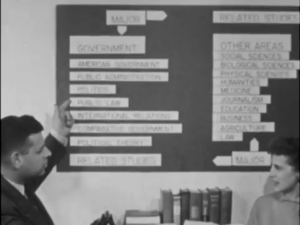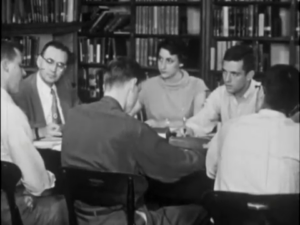This is the second (and final) part in our spotlight on educational films about politics and government – just in time for the 2012 Presidential Election. Our previous post looked at the ways in which polling can be used to predict election results and highlight the way certain demographic groups vote through the film Making Inferences from Statistical Data. Today’s film, The Study of Government, takes a more qualitative approach, which makes it a great companion piece. Like last week’s film, today’s was produced at Indiana University, is held by the Indiana University Libraries Film Archive, and is just one of several IU produced educational films IULFA streams online. It’s possible the film was used as a way to recruit students as political science majors.
Though The Study of Government comes from an era that might seem distant to us today, the short film asks a question that lives on: How can the study of politics and government (aka political science) benefit our political process? Or, what role should political science and political scientists play outside of the academy?
The film starts out by mapping what political science looks like as an academic discipline. While political science departments continue to debate the merits and value of certain sub-fields, the structure of political science at the time this film was made still exists. The film identifies American politics, public administration/policy, political theory, comparative politics, and international relations as the major sub-fields.

The tone of the film and the way it describes the various sub-fields marks it as a clear product of the Cold War. It’s brief narration over political theory emphasize American political thinkers with concepts such as democracy, equality, and freedom while, inaccurately, linking figures such as Machiavelli, Nietzsche, and Hitler as advocates of untrammeled state power (a strange and contradictory mix of people!).
The narrator, interestingly, notes the increased importance and complexity of international relations and comparative politics. This emphasis on individual rights and the increasing interest in world politics clearly come out of a Cold War mentality that ideas about state and economy are central in the new post-1945 geopolitical environment. The narrator emphasizes the necessity of understanding the political history and customs of other nations in order to have a successful foreign policy. It is very likely that comparative politics and international relations is highlighted due to Indiana University’s strong foreign language programs. Indiana University has retained this reputation, with 82 different languages having been taught within the last 10 years.

The Study of Government closes by stating that knowledge about government and politics alone will not produce ideal, engaged citizens. Our narrator defends the idea that an educated citizenry needs a well-rounded base of knowledge. Having a basic understanding of other subjects such as literature, history, physical and natural sciences, etc. is essential for engaged participation in the American system. The final bit of wisdom our narrator imparts us with is that the study of political science has real world consequences – from lofty theoretical debates to mundane policy details.
~ Sean Smalley
Leave a Reply